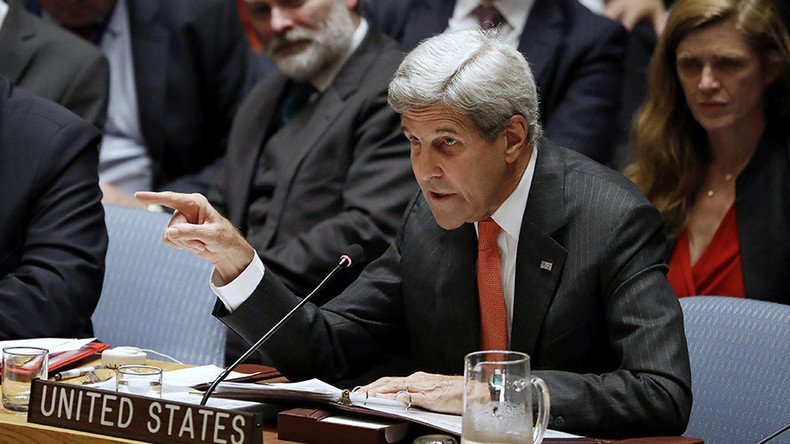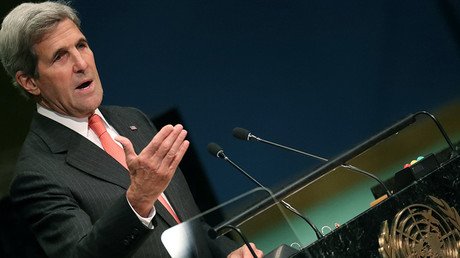'US priority in Syria: Stop Aleppo from falling to pro-Assad forces'

Strategically, if the jihad terrorists lose eastern Aleppo strategically this war is over, Jim Jatras, a former US diplomat, told RT. The fighting may go on for a while, but that will be the tipping point in terms of who is going to win, he added.
The international bitterness over the crisis is Syria has been laid bare at a special UN Security Council meeting underway in New York.
Russian Foreign Minister Sergey Lavrov said he wants a thorough and impartial investigation into the deadly attack on the UN aid convoy near Aleppo, which the US has blamed on Russia without presenting any evidence.
Kerry, who seemed upset by Lavrov’s call to re-launch an intra-Syrian political dialogue “without preconditions and ultimatums,” went on to say that listening to Mr. Lavrov made him feel as if he was in a “parallel universe.”
RT: Kerry's attack on Lavrov was rather personal and maybe even undiplomatic for such a meeting. Why did he act as he did? Were you surprised?
Jim Jatras: No, not so much surprised. But I thought it was very significant. He did try to come across, and I think sincerely in a very personal human way. There are two things we really need to look at here. One is the incident itself with the hitting of this convoy. And the other one, what does it mean in the terms of the strategic situation in Syria.
As far as hitting the convoy, this is the kind of thing we’ve seen so many times before, not only in Syria but in Bosnia, in Kosovo, Libya and other places. Something happens and within minutes Western officials are saying “this is who is at fault, here is what happened, and here is the blame for it.” And then only afterwards, after all the headlines have gone around the world about responsibility, do we hear any argument about what the details are, what might or might have not happened. And those will be on page 19 somewhere.
The other thing, of course, is in his statement Secretary Kerry said two things of really grave importance. One is, he demanded what amounts to a ‘no-fly zone’ - the grounding of all Russian and Syrian aircraft. And he also said that only ISIS and Al-Qaeda should be excluded from the ceasefire, which means other terrorist groups - like Ahrar al-Sham and al-Zenki (Harakat Nour al-Din al-Zenki) - presumably are now moderate, legitimate opposition, even though they are obviously Wahhabist jihadist terrorists.
"I think that John Kerry is torn really between an earlier desire as a diplomat to leave his mark on history as we are coming to the end of this administration. He managed to get a ceasefire with the help of Lavrov and with the help of the Russians. He is also torn between the whole Western propaganda strategy of demonizing Russia. The problem here is that to a certain extent neither of the superpowers can have 100 percent control of what is happening on the ground. The Russians are in the position because it is the regime they can at least control large part of it, while the Americans have armed groups… they cannot really have control over them. And then prior to that they had a strategy of trying to do Afghanistan. We should try not to make the same mistakes that we made in Afghanistan by trying to defeat Russia in Syria the way they did in Afghanistan. That would be a disaster for everybody. I think they should move away from that and really try to cooperate." - Adel Darwish, commentator, historian, author
RT: The US wants Russian and Syrian planes grounded so that rebels can separate themselves. Is this just opportunism or common sense?
JJ: Of course it is opportunism. Let’s be clear: Right now, the Obama administration has one priority and that is to stop eastern Aleppo from falling to Syrian government forces. Strategically, if the jihad terrorists lose eastern Aleppo strategically this war is over. The fighting may go on for a while, but that will be the tipping point in terms of who is going to win. They can dance around any way they want, but the bottom line is always going to be to try and stop the Syrian and Russian forces from decimating these jihadists and changing the outcome.
#US@JohnKerry 2his counterpart #Lavrov :"I sort of felt we`re in a parallel universe here" https://t.co/ZKxHlN6sQR Guess Lavrov felt d same
— Zlatko Percinic (@ZlatkoPercinic) September 22, 2016
RT: The French foreign minister also said he wants Syrian troops to stay in their barracks. What do you make of that?
JJ: No, it’s not. And if they think they are going to get a Security Council resolution through this obviously the Russians won’t accept it, the Chinese won’t accept it. Theoretically, we are all agreed. Mr. Kerry said, “We all agree that ISIS and Al-Qaeda are our common enemy.” How does grounding the Syrian Air Force and Russian Air Force…defeat ISIS, defeat Al-Qaeda? It doesn’t. In effect, they would be the beneficiaries of these policies.
"I think it is a bit shrill, especially since we don’t really understand the entire situation on the ground. Kerry keeps saying that there are indications of Russian involvement in what happened in Syria and we keep hearing these vague notions, but what we don’t have is evidence. So, I am very concerned at the rhetoric that is sort of ratcheting up the tension. Russia and the US had just signed an agreement for peace in Syria and all of a sudden that has just been blown apart. Then we had this very disturbing diatribe from Samantha Power. The warmongering rhetoric is very concerning. It is building up the lack of trust when we are at the precipice of peace. We really need to walk back on the rhetoric." - Elizabeth Murray, former Deputy National Intelligence Officer for the Middle East
RT: They are both set to meet on Friday again. How do you think that meeting will go?
JJ: I assume Mr. Lavrov must know when he talks to Mr. Kerry that as much as they may seem to agree on various details, in terms of where the two countries want to go in Syria they are poles apart. The bottom line for the Obama administration is regime change, which means a jihadist victory in Syria, and that is the rabbit they are constantly trying to pull out of the hat. I don’t know why the Russian side keeps talking to them as though they have common goals and interests, when in fact they don’t. They are dealing with ideologues here who are dancing to the tune called by the Saudis and other supporters of radical Islamic forces, and they’ve got to stop entertaining that they can somehow make a deal on this… There are no real moderates. They are all Wahhabists, they’re all terrorists, they’re all jihadists.
The statements, views and opinions expressed in this column are solely those of the author and do not necessarily represent those of RT.













